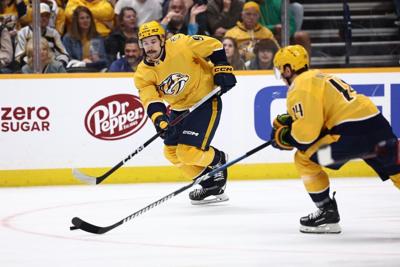The last thing the Predators want to do is dwell too deeply on their 4-2 loss to the Vancouver Canucks in Game One of their Western Conference first-round playoff series on Sunday.
Still, there has to be some team-wide frustration after surrendering leads of 1-0 and 2-1, the latter in place for nearly nine minutes of the third period.
A victory over the Canucks would have given the underdog Predators a surprising leg up in the series and allowed Nashville to steal home-ice advantage. Also, nobody would be talking about the fact that the Preds have never won a playoff series in 13 attempts when losing Game One.
Instead, the Predators will look to steal a road game and knot the series in Game Two on Tuesday at 9 p.m., seeking to snap Vancouver’s five-game winning streak over Nashville in the process.
“I thought we did some good things,” said Predators forward Jason Zucker, who scored the team’s first goal. “I think there were a lot of things we probably could have done a little better based on the way we’ve played throughout the last stretch [of the regular season]. Obviously they capitalized on some mistakes and it cost us.”
What must the Preds do better in Game Two?
Here are four things that need to happen:
Need some 'Scoresberg'
Predators forward Filip Forsberg raised expectations on himself during a record-breaking season, one that saw him set career highs in goals (48), assists (46) and points (94). In addition, Nashville coach Andrew Brunette said more than once during the regular season that when the Preds needed a forward to be a game-changer, they turned to Forsberg.
So Forsberg’s assist was nice in Game One, but he was fairly quiet otherwise. His seven shot attempts did lead the Predators, but one was blocked and three missed the net. Forsberg had just one shot on goal during the Preds’ three power plays, and his on-ice expected goal differential was minus 0.73, the fifth-lowest figure on the team.
The Predators’ most talented forward needs to make more of an impact, whether in five-on-five play or on the power play, moving forward.
High-level goaltending
Juuse Saros didn’t give up any goals that would be considered embarrassing, but he still needs to be better than he was in Game One, when he yielded three goals on 20 shots (.850 save percentage).
In particular, the Canucks’ first two goals — though both were slight redirects — looked like the kind of shots Saros often stops. Vancouver’s Elias Lindholm fired a wrist shot from beyond the top of the face-off circle that appeared to graze Roman Josi’s stick on the way to the net. But it still looked as if Saros had enough time to adjust and make the save.
On Vancouver’s second goal, defenseman Quinn Hughes’ lofted wrist shot from just inside the blue line beat Saros after a slight touch by teammate Pius Suter. But it didn’t appear as if Saros, battling through screens, ever saw the puck, so the redirection may not have mattered.
Per Moneypuck.com, one of the Vancouver goals was a low-danger chance, one was a medium-danger chance and one (the third) was a high-danger chance. Saros’ goals saved above expected was minus 0.25, well behind that of Vancouver’s Thatcher Demko, who was at 0.53.
The Preds have to at least break even in goal to have a chance in this series.
Power-play consistency
The Predators would probably be happy to average one power-play goal per game in the series, which is where things stand heading into Game Two.
But despite a Ryan O’Reilly man-advantage goal that gave the Preds a 2-1 lead midway through the second period on Sunday, Nashville’s power play overall wasn’t effective enough when it had an opportunity to put Vancouver away. The Predators had three man-advantage opportunities while leading 2-1 and failed on each, managing a combined three shots on goal.
In fact, the Preds managed only five shots on goal in four power plays against the Canucks, who finished the regular season ranked 18th in penalty killing at 81.9 percent. O’Reilly and Forsberg each had just one power-play shot on goal, while neither defenseman Roman Josi nor forward Gustav Nyquist had a single power-play shot on goal.
Again, the Predators would probably be comfortable with one power-play goal per game. But Nashville needs to at least threaten on the other man advantages, and the Preds certainly don’t want to give up momentum on their own power plays — as was the case at times on Sunday.
Taming the top line
In terms of points production, Vancouver’s powerful top line of Pius Suter, J.T. Miller and Brock Boeser didn’t rack up outrageous numbers, combining for one goal and two assists.
But the trio dominated puck possession, keeping the Predators pinned in their own zone and creating plenty of scoring chances.
The Suter-Miller-Boeser line helped the Canucks create 19 shot attempts while on the ice Sunday, while surrendering just six. To put that in perspective, no other line combo — neither Nashville’s nor Vancouver’s — was on the ice for more than 10 shot attempts.
In addition, Vancouver’s top threesome was on the ice for five high-danger chances, per Natural Stat Trick, while surrendering zero to the Predators.
The Preds primarily used the Kiefer Sherwood-Michael McCarron-Cole Smith line and the Jeremy Lauzon-Alexandre Carrier defensive pairing against Vancouver’s top trio. Those five will no doubt bear much of the responsibility for keeping Suter, Miller and Boeser in check for Game Two as well.

